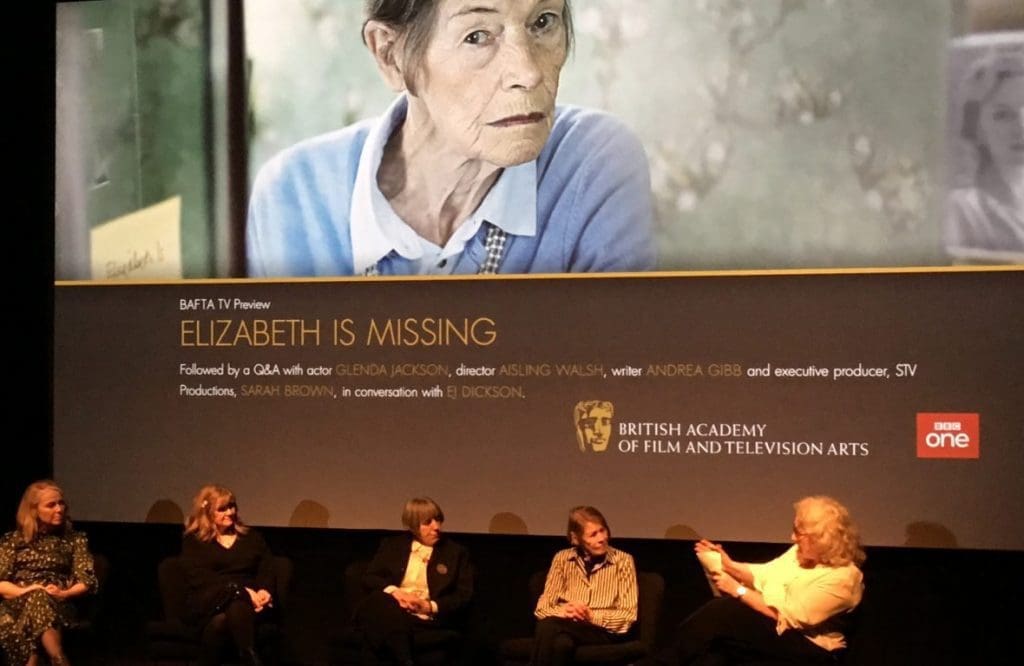
How to make your Time for a Cuppa event dementia-inclusive
How to host a dementia-inclusive Time for a Cuppa.
How we supported the production of new BBC drama ‘Elizabeth is Missing’ to accurately portray dementia
Our dementia specialist Admiral Nurses are being asked more and more to support production teams of theatre, film and TV programmes on how best to portray dementia.
The profile of dementia in the arts has risen sharply over the last decade; there is a growing number of fictional novels that give us a glimpse into what it might be like to have dementia. We have seen some favourite soap characters develop dementia for instance and there have been film portrayals of people with dementia. I have had the privilege of reading drafts of novels and film scripts and advising actors on the nuances of presenting an accurate yet sensitive portrayal of characters.

The most recent and most rewarding of these opportunities was in advising the lead actor and production crew of the making of the BBC’s new drama ‘Elizabeth is Missing.’ The request to support the production came as a result of Dementia UK’s growing national presence. Having already read ‘Elizabeth is Missing’ [2], this request sparked my interest, even more so when I learnt that the main character to play the person with dementia (Maud) was to be Oscar winning actor and former Labour MP, Glenda Jackson. I arranged to read the script and a meeting with Glenda and the production team was arranged. We discussed how and why Maud might have reacted to certain situations. I was amazed to find out that this film project had been the nugget of an idea and in the making before even the novel was published. From this point on though the team forged ahead and I was then invited to the films premiere in Mayfair on 27th November (an STV Productions, BBC One and BAFTA event).
The character of Maud was probably one of the most honest and accurate portrayals of a person with dementia that I have seen.
The film and book have two main thrusts; it is essentially a ‘murder mystery’ but played out through the eyes of a person with dementia. It skilfully weaves us through the altered reality of a person with dementia as they grapple with the present day and the effects of living with dementia with the memories and emotions that call from their past. The character of Maud was probably one of the most honest and accurate portrayals of a person with dementia that I have seen. There was humour laced in at times which gave the character and context authenticity. There was no Hollywood glitz but a sense of ‘everydayness’ and a tangibility to her character that many families affected by dementia will be able to recognise and relate to.
Parts that stood out for me included the close bond that Maud had with her granddaughter. Often we consider the relationship between the person with dementia and their most direct carer, often a spouse or adult child. What we witnessed in this grandmother-granddaughter relationship was an unconditional acceptance and love with an empathy that was very moving. The second most memorable part was when Maud, sat at the bus stop, was approached by her daughter, Helen, but did not recognise her as such and the resulting conversation was one you would have expected her to have had with a stranger. Helen was aware that her mother had failed to recognise her and was very visibly distressed. Indeed, as Admiral Nurses we counsel many family members on this very upsetting loss of recognition. As Helen turned back to face her mother, Maud became immediately aware that it was in fact her daughter and became distraught that she had failed to recognise her. This was an incredibly touching and poignant part of the film.
I feel very proud and yet humbled at the same time to have played a part in this outstanding and sensitive portrayal of what it might be like to live with dementia. ‘Elizabeth is Missing’ is to be screened on BBC One on Sunday 8th December at 9pm. I hope that it is as well received by the viewing public and offers a valuable insight into the reality of a person living with dementia.

How to host a dementia-inclusive Time for a Cuppa.

Ruby talks us through her working day supporting families affected by dementia in local communities.

The UK’s largest and only event covering all aspects of the fight against dementia from drug discovery to treatment to care is taking place at ExCel from 14th-15th June 2024.